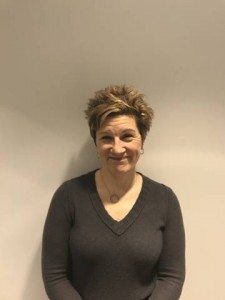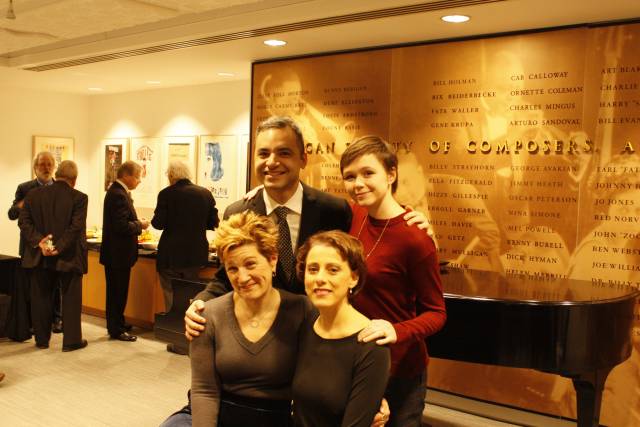

On February 6th, distinguished guests, friends, and journalists got together at the ASCAP headquarters in New York City, to honor the recipients of this year’s Kleban Prize in Musical Theatre. Named after the late composer and lyricist Edward Kleban, who as guest Maury Yeston reminded attendees wrote “the Hamilton of its time” (he meant A Chorus Line), the award, which consists of 100 thousand dollars payable in two installments, is given to both a librettist and a lyricist who show promise in the world of musical theatre. This year the recipient of the librettist award happened to be Tony-winner Lisa Kron, who along with composer Jeanine Tesori became the first all-female team to win Tonys for Fun Home in 2015.
Before writing the haunting songs for the Best Musical winner, Kron was already an accomplished actor and playwright, but she explained doing a musical was the ultimate challenge because it was the artform where your craft had to really shine through. “You can’t fake a musical” she joked as she accepted her award. Members of the original Broadway production of Fun Home came to celebrate Kron, with Judy Kuh and Emily Skeggs performing the heartbreaking “Days and Days”. I spoke to the charming Skeggs about Kron’s work, she said “Telephone Wire” gets her “every time”, and found herself singing it over and over. “I think it’s so universal” she continued, “everyone’s had that moment in the car with someone you love and respect, where you’re trying to connect with someone and it’s not happening”, she smiled “it’s my dad’s favorite too”.
Skeggs perfectly described the way in which Kron’s lyrics seem to take you by surprise. Considering Fun Home was Kron’s first musical certainly means all eyes, and ears, will be on her next project. In the meantime Fun Home is in the middle of a national tour, “New York is an incredibly accepting community where you can be yourself”, added Skeggs, but as the show is being seen in more conservative cities, it might bring them the hope, joy and life lessons it did in NYC. “Anyone can find their way inside of [Fun Home]” she added, “I think it’s incredibly important it’s seen across the country as a beacon of hope for people who are persecuted, and the people who need to learn from it”. I also was able to speak to Kron, who proved as eloquent and inspiring as her lyrics.
Does getting awards ever get old?
(Laughs) No, no, never.
What does it mean for you to receive this award from the Kleban Foundation?
Several people have said to me you’ve already won the Tony, but Fun Home was my first musical, I’d already been preemptively calling myself a one hit wonder, so this award is big inspiration and a vote of confidence, I have so much to learn still.
Would you say your brain goes to different zones when you’re writing plays vs. when you’re writing lyrics?
Lyrics is definitely the hardest thing I’ve ever done. They’re two things that don’t come naturally to me: compression and a kind of high metaphor, and that’s not how my brain works. They’re muscles I feel sometimes I know how to get right, but sometimes I have to do hours, and hours of trial and error, to get something approximating what a lyric is, they’re not naturalistic, they’re not logical. They’re a challenge, but it’s the most satisfying thing to write words and hear them lifted into music. It’s the biggest thrill there is to be had in the theatre as a writer.

Did you often discover things you wrote that took on completely different meanings when you heard them sung, that made you go “did I write that?”
That was my constant experience working with Jeanine. There were months of me writing things I thought were lyrics and she’d be “not a lyric”, and then she circled two lines and say “that’s a lyric”. I asked why, and early on she took two lines I wrote, it was actually “Daddy, hey Daddy come here” which are the opening lines of the musical, and she set them to music because she wanted me to get the feeling of what it would be like. I kept going “oh” all the time, because Jeanine was setting the bar so high and doing all things I couldn’t have imagined.
I was so grateful to learn that the show was going on tour after it closed on Broadway, because I feel the show is more needed in conservative states. What’s the experience of taking it outside NYC been like?
It’s a great thing that it went on tour, it’s always sad to close a show, but Fun Home had such a complete life, it closed with the cast we opened with. I’m sure we could’ve found wonderful actors to do the show, but there was something about the integrity of the original cast, and there was a community of people who had covered certain roles, but who were steeped in the show. The tour has been exceedingly well received, we just opened in San Francisco and the original idea was to start the tour there, but Laura Kepley who runs Cleveland Play House said she wanted it to open there, because it needed to open in the middle of the country. That was amazing, it was around the time of the Republican Convention which had been in Cleveland, so it was great. The theater in Cleveland is huge too, so more people saw it in one show than they would see it in an entire weekend at Circle in the Square, it was crazy!
I loved hearing you speak at the Out on Broadway panel at BroadwayCon, because you spoke with such passion about activism. Have you had the conflict of wondering whether the arts should focus on activism or escapism right now?
It doesn’t have to do one thing, we need all of those things, we need joy, entertainment, dancing, music. We need to be in rooms where we allow those forms to energize us, we need anything that makes us feel connection and humanity with each other. And then we need to, I speak for myself, I’ve been activist adjacent for my whole life. I’ve done some activism, but I haven’t been an activist particularly. That’s different now, and certainly there are thousands of people who feel the same way. This is an extraordinary moment, it’s certainly changed the context where I’m writing from, the projects aren’t different, but the world view, the feeling, and the suppositions I presume an audience would have about the nature of the world are different now, so that changes the work. But that work doesn’t substitute for me going in the streets and doing actual activism.
For tickets to Fun Home go here.